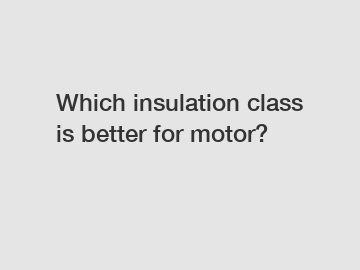Jan. 07, 2024
Hardware
Which Insulation Class is Better for Motors?
Electric motors are used in a wide range of applications, from industrial machinery to household appliances. One crucial aspect of motor design is insulation, which protects the motor winding and ensures its efficiency and durability. Different insulation classes are available, each with its own benefits and limitations. In this article, we will explore the different insulation classes and determine which one is better for motors.
Class F Insulation: .

Class F insulation is the most commonly used type and can withstand temperatures up to 155 °C. It is primarily used in motors that operate at high temperatures, such as those used in industrial applications. Class F insulation offers excellent thermal properties, good resistance to moisture and chemicals, and a long service life. However, motors with Class F insulation may be more expensive compared to other classes.
Class H Insulation:
Class H insulation, the next level up in terms of temperature rating, can handle temperatures up to 180 °C. Motors with Class H insulation are used in applications where high-temperature resistance is essential, such as high-performance industrial machinery and aerospace systems. Class H insulation provides excellent thermal stability, protection against thermal overload, and greater resistance to electrical stress. Although motors with Class H insulation are more expensive, they offer increased reliability and performance.
Class B Insulation:
Class B insulation is the most economical option and can withstand temperatures up to 130 °C. It is commonly used in household appliances and less demanding industrial equipment. While Class B insulation may offer sufficient protection in certain applications, it is not suitable for motors exposed to high temperatures or heavy electrical loads. The advantage of Class B insulation is its cost-effectiveness, making it a popular choice for low-power motors and appliances.
Class A Insulation:
Class A insulation has the lowest temperature rating, with the ability to handle up to 105 °C. It is used in motors that operate at low temperatures or those with less demanding requirements. Motors with Class A insulation are commonly found in small household appliances, ceiling fans, and other similar applications. The major advantage of Class A insulation is its affordability, but it may not be suitable for motors in high-stress or demanding environments.
Conclusion:
When deciding which insulation class is better for a motor, several factors need to be considered, including the operating temperature, application, and budget. If a motor operates at high temperatures, motors with Class F or Class H insulation would be the optimal choice. Class F insulation ensures excellent thermal properties and resistance to moisture and chemicals. On the other hand, motors with Class H insulation offer even greater thermal stability and protection against thermal overload. .
For motors operating at lower temperatures or in less demanding applications, motors with Class B or Class A insulation can be considered. Class B insulation is cost-effective and suitable for low-power motors, while Class A insulation is the most affordable but has limited temperature capabilities.
In conclusion, the best insulation class for a motor depends on various factors. Therefore, it is important to thoroughly evaluate the motor's requirements before making a decision. For further assistance or any questions, please do not hesitate to contact us.
Contact us to discuss your requirements of Bus motor core, Sub-assembly production, Bus motor core. Our experienced sales team can help you identify the options that best suit your needs.
If you are interested in sending in a Guest Blogger Submission,welcome to write for us!
All Comments ( 0 )